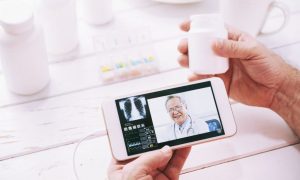Editor’s Note: We are grateful to Boomer Benefits for this and past articles by Danielle K. Roberts. Since many of our readers are either seniors or those counseling seniors, we thought this excellent summary of the pandemic and medicare was worth sharing with all of you. A link to the Boomer Benefits site is at the end of the article. Be Safe!
LL and LB
Coronavirus, Medicare, and Telemedicine: Everything You Need to Know
by Danielle K. Roberts
 If you’re like most of us, the global coronavirus pandemic has you feeling a little unsettled and concerned. Our daily routines are disrupted, we’re avoiding family, friends, and community social circles, and feel a frisson of fear every time we sneeze or cough. Even a simple thing like grocery shopping has become a worrisome ordeal.
If you’re like most of us, the global coronavirus pandemic has you feeling a little unsettled and concerned. Our daily routines are disrupted, we’re avoiding family, friends, and community social circles, and feel a frisson of fear every time we sneeze or cough. Even a simple thing like grocery shopping has become a worrisome ordeal.
We’re living in uncharted territory. Seniors, who are especially vulnerable to the effects of the virus, are caught between a rock and a hard place. It’s important to follow the CDC guidelines and stay home to protect yourself, but what happens if you don’t feel well and need medical care?
The good news is that Medicare is responding to the coronavirus crisis and making it easier than ever to get the care you need, even if you can’t—or shouldn’t—leave your house. With expanded coverage for telemedicine, Medicare is making sure seniors can get necessary healthcare without the risk of exposure to COVID-19.
Here’s what you need to know about coronavirus, Medicare, and telemedicine.
Medicare will now cover your telemedicine appointment. Recent changes have been made to provide better access to patients from their homes.
What is coronavirus?
Coronaviruses have been around a long time; some are harmless to humans and some cause disease. In some cases, the disease is mild—similar to a slight cold. In other cases, the disease can be severe. Both the SARS and MERS epidemics were caused by a coronavirus.
In 2019, a new strain of coronavirus appeared in Wuhan, a city in China. This new virus, called COVID-19, can cause severe respiratory

symptoms and pneumonia. The disease is spread among humans through droplets from coughs and sneezes. There is currently no vaccine for this strain of coronavirus.
Symptoms of coronavirus can develop any time up to 14 days after exposure. The virus attacks the respiratory system; symptoms include fever, cough, and shortness of breath. In rare cases, it can cause respiratory failure, kidney failure, and even death.
Danielle Roberts of boomerbenefits.com joins ABC News 10 to answers viewer questions about telemedicine and health insurance during the coronavirus (COVID-19) outbreak.
CLICK HERE TO GO TO THE PAGE WITH THE VIDEO
Who is at risk for coronavirus?
Anyone can get coronavirus, but certain people are more at risk for dangerous complications from the disease. According to the CDC, these people are especially vulnerable to COVID-19:
Coronavirus is also known as COVID-19
- Seniors
- People with asthma
- People with diabetes
- People with heart or lung disease
- People with HIV
- Pregnant women
You can lower your risk for coronavirus and slow the spread of disease by following the CDC recommendations:
- Avoid unnecessary travel, especially on airplanes and cruise ships.
- Clean and disinfect your home, paying special attention to doorknobs, light switches, toilets, faucets, sinks, and cell phones.
- Avoid touching surfaces in public places—elevator buttons, handrails, and door handles—and avoid places where people gather.
- Wash your hands often with soap and warm water, rubbing them together for at least 20 seconds. If soap and water aren’t available, use a hand sanitizer containing at least 60% alcohol.
- Try not to touch your face, especially your eyes, nose, and mouth, since the virus enters the body through mucous membranes.
- Maintain a distance of 6 feet or more between yourself and other people.
Special recommendations for seniors
Seniors are in a difficult spot. They are at higher risk because of their age and also because many have underlying conditions such as hypertension or heart disease. Not only are they more likely to contract coronavirus, but they are also more likely to have severe symptoms.
You can better protect yourself by following the CDC recommendations for high-risk individuals:
- Obtain a three-month supply of your daily medications. You may need to call your doctor or pharmacist to get a prescription for an extended supply of doses.
- Stock up on over-the-counter medications to treat fever (aspirin, Tylenol, ibuprofen). Don’t forget supplies such as thermometers, facial tissues, and hand sanitizer. If you have underlying conditions, additional supplies such as a blood pressure cuff and pulse oximeter may be useful for telemedicine monitoring.
- Fill your pantry with household staples and groceries to last several weeks.
- Build a network of family, friends, and community support services who can deliver meals, medications, and supplies if your stock runs low.
Keep record of your temperature each day. This will be helpful for your doctor if you do begin to develop symptoms.

Recording your temperature every day is a good way to stay on top of potential problems; fever is one of the first signs of the disease. If you start to feel ill, you’ll have a temperature log to share with your healthcare provider to help her make an accurate diagnosis.
Isolation isn’t fun; it can be lonely and boring to be cooped up at home. But resist the urge to ask your children and grandchildren to visit, even if no one is showing signs of illness. With a 14-day incubation period, people can spread the virus before they show symptoms. Take advantage of technology like FaceTime to stay in touch with loved ones.
If you’re in good health, don’t feel like you’re stuck indoors. If the weather is nice, take a walk around the neighborhood—maintaining a safe distance from others, of course. Sit in the sun and listen to music or read a good book. A little fresh air works wonders when you’re self-quarantined.
What should I do if I feel sick?
With all the potential complications from coronavirus, it’s understandable if your first response is to go to the ER or urgent care when you feel sick. But heading to the hospital is quite possibly the worst thing you can do.
Hospitals are full of sick people, especially in the middle of a pandemic. If you don’t have COVID-19 before you get to the ER, you might pick it up once you get there. And if you do have coronavirus, it will take some time to diagnose it, which means you could be infecting others while you wait for your results.
If you have any symptoms of COVID-19, call your primary care physician or county health department right away. Depending on your situation, they may direct you to a drive-through testing site or conduct a telehealth visit to diagnose your condition. Home testing kits are coming on the market, which means you may soon be able to test for coronavirus without leaving your house.
If your symptoms aren’t related to coronavirus, it’s still best to call your doctor before seeking treatment outside the home. Many conditions can be managed with telemedicine and you’ll avoid unnecessary risk of exposure if you’re able to remain in place.
For medical emergencies—chest pain, difficulty breathing, symptoms of stroke, or serious falls, for example—don’t waste time calling your doctor. Dial 911 right away.
What is telemedicine?

People often use the terms telemedicine and telehealth interchangeably; they’re related, but there are a few differences. Telemedicine is a range of technologies used by healthcare professionals to diagnose and treat illness and disease from a remote location. Telehealth, on the other hand, is focused on remote health monitoring and health maintenance.
Telemedicine is used by healthcare professionals to diagnose and treat illness and disease from a remote location.
If you have a cough and runny nose, and you have a video call with your doctor to diagnose your illness and prescribe an antibiotic, that’s telemedicine. If you’re discharged home after a heart attack and your doctor uses remote monitoring equipment and telephone check-ins to keep an eye on your heart rate and blood pressure, that’s telehealth.
Telemedicine uses communication technology to simulate an office visit. You and your doctor can see and talk to one another in real-time over a secure connection. Your doctor can prescribe medications and order lab tests and x-rays through telemedicine just as he could with a face-to-face visit.
Most telemedicine platforms don’t require any special equipment. You simply download an app on your smartphone or computer. You don’t pay per-minute connection charges, although you may have data charges depending on your cell phone plan.
How does Medicare cover telemedicine for coronavirus?
Original Medicare has covered telemedicine in certain situations for several years. However, the benefit was limited to people in rural areas and required them to travel to a local clinic or hospital to video conference with a doctor. In 2019, Medicare expanded the telehealth benefit to cover virtual check-ins for patients who had established relationships with a provider and were under ongoing care for a particular condition.
Early in March, President Trump issued an emergency declaration allowing the Centers for Medicare and Medicaid Services to waive restrictions for telemedicine and telehealth services. Under the new rules, Medicare beneficiaries can receive a wide range of health services right in their homes. These include:
- Medicare telemedicine visits: Medicare will cover telemedicine encounters for any office visit, hospital visit, or other health service that typically takes place in person. Health professionals such as doctors, nurse practitioners, social workers, dieticians, psychologists, and medical therapists can now evaluate, diagnose, and treat Medicare beneficiaries using telemedicine video technology. The requirement for an established provider-patient relationship will not be enforced during this public health emergency. This means you can call any doctor or hospital offering telemedicine whether you’ve previously been seen there or not.
- Medicare virtual check-ins: Medicare will pay for telephone and/or text check-ins with established patients. For people with chronic conditions, these virtual check-ins mean they can get frequent monitoring and advice to help them stay healthy without leaving home.
- Medicare e-visits: E-visits take place through a patient portal and don’t involve any face-to-face or voice contact between the patient and provider. These are usually non-emergency issues, such as a medication refill request. E-visits require an established patient-provider relationship.
In the past, if Medicare covered these services, they were subject to the standard Part B deductible and coinsurance amounts. President Trump’s emergency declaration authorizes providers to waive the Part B coinsurance or copayments for telemedicine services, as long as they do so uniformly. In other words, a doctor can’t waive the coinsurance for one patient and collect it from another.
If you have a Medicare Advantage plan, you may have telemedicine benefits beyond those authorized by Part B. Call your plan’s member services department for details.
How does Medicare cover coronavirus testing and treatment?
Medicare covers coronavirus testing at 100%. You do not have to meet your deductible before testing is free. Medicare Advantage plans are also encouraged to waive any cost-sharing for coronavirus testing to make sure every senior gets testing when it’s necessary.
All medically necessary treatment for coronavirus is covered by Medicare. In addition, Medicare will pay for inpatient stays even if you are medically able to be discharged but need to remain in the hospital for quarantine purposes.
Other Medicare benefits for coronavirus
If you’re covered by a Medicare Advantage plan, you may have access to expanded benefits that may be helpful during the public health emergency. For example, some Medicare Advantage plans pay for meal and grocery delivery. Others cover home health aides who can help you clean and disinfect your home. If you need to fill a prescription and your pharmacy doesn’t deliver, your plan may also pay for a private ride service to and from the pharmacy so you can avoid public transportation.
Many Medicare Advantage plans also have benefits for over-the-counter medications and devices. Your plan may pay for your stockpile of Tylenol, hand sanitizer, and a home blood pressure cuff or pulse oximeter to help your doctor monitor your health over telemedicine visits. Check your plan brochure for details.
The bottom line about Medicare and coronavirus
We’re living through unprecedented times and it’s normal to feel like things are spinning out of control. The good news is that you can reduce or eliminate your risk of coronavirus if you follow the CDC’s recommendations and stay at home until the crisis is ended.
Many grocery stores are offering delivery so that you don’t have to leave your home.
Medicare is there to support you in all your health needs during this time. By expanding benefits for telemedicine, you can avoid a trip to the doctor and potential exposure to the virus. Don’t be afraid to call your doctor and request a telemedicine encounter—you’re lowering the risk of infection for yourself and others. And you’ll get the same quality of care you’d get in the office.
If you need medication, ask your pharmacy to deliver it and any other health supplies you may need. If they can’t, call your Medicare plan to see which pharmacies in your network offer home delivery. Your plan’s mail order pharmacy is another option to avoid unnecessary trips.
The team at Boomer Benefits is committed to helping you with your Medicare options in this time.
Take advantage of businesses offering extra services to help keep you safe. Many grocery stores are offering doorstep delivery; don’t risk getting sick because you’ve run out of eggs or coffee. Services such as Instacart and Amazon Prime can bring virtually anything you need right to your door. You can even get takeout from your favorite local restaurants delivered to your house.
Remember, staying home doesn’t mean ignoring your healthcare. Phone your doctor if you feel sick or have questions about your health. Eat a healthy diet and get plenty of rest to keep your immune system at its best. Use your time at home to learn something new or re-engage with a neglected hobby. Call your friends and family regularly to keep your spirits up and encourage one another to stick with the program until the CDC says it’s OK to return to normal life.
We’ll all get through this together. The experts at Boomer Benefits are here when you need Medicare advice and our offices will remain open by phone to offer help when you need it.
 “We are in the business of helping people understand Medicare, in simple, plain terms that everyone can understand. We believe that it’s important that you first understand Medicare itself. You can’t understand your supplement options until you first get a handle on your basic Medicare benefits. Fortunately, we’ve mastered how to make it simple.”
“We are in the business of helping people understand Medicare, in simple, plain terms that everyone can understand. We believe that it’s important that you first understand Medicare itself. You can’t understand your supplement options until you first get a handle on your basic Medicare benefits. Fortunately, we’ve mastered how to make it simple.”

Telemedicine is making a very positive contribution to healthcare during this pandemic, and is being used in a variety of ways. Thanks for sharing this helpful blog. Visit www.patientmd.com